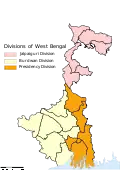Nalinaksha Sanyal
Nalinaksha Sanyal (1898 – 29 October 1987) was an Indian politician, economist and freedom fighter.
Nalinaksha Sanyal | |
|---|---|
| Member of Legislative Assembly | |
| In office 1967–1971 | |
| Constituency | Karimpur |
| Personal details | |
| Born | November 1898 |
| Died | 29 October 1987 |
| Political party | Indian National Congress / Bangla Congress |
Education
He studied at Krishnath College, Baharampur, and Presidency College, Kolkata, and taught economics at Krishnath College. He earned a master's degree from the London School of Economics and secured a PhD in economics from London University after carrying out research under Harold Laski.[1]
Political career
While in London, Sanyal served on several committees for the London branch of the Indian National Congress, a banned organization. He was arrested twice for his participation. Sanyal returned to India to become a professor at Calcutta University, but the government disallowed his appointment because of his activism. Sanyal took a position with insurance companies New India Assurance Co., the Metropolitan Assurance Co., and the Hindustan Co-operative Society Ltd.
Sanyal continued to actively protest against British colonial rule and was imprisoned seven times. He was elected to the Bengal Assembly and served as Chief Whip of the Indian National Congress of undivided Bengal, prior to the partition of the province. He was a vocal critic of the colonial government's policies during the Bengal Famine in 1943.[2] In 1946, Sanyal was at the forefront of efforts to avoid the Partition of India. His suggestion of a loose federation was widely circulated and debated but was ultimately not adopted.[3] When India was partitioned in 1947, he and Atulya Ghosh were able to convince the British to leave Maldah district in India (the area had a population that was evenly divided between Hindus and Muslims).
After the independence, Sanyal remained an active force in building the new India and held many senior positions in government as well as represented India in international bodies. In 1968 he established Karimpur Pannadevi College at Karimpur, Nadia district.
Social activities
Sanyal was a modern personality and free thinker in his time. He married in 1924 with daughter of Sharat Chandra Bhattacharya of Baharampur without any rituals. He was strongly against dowry, castism, religious formalities. Even being a Brahmin he invited his Muslim friend Kazi Nazrul Islam to his marriage ceremony ignoring the social policing and restrictions.[1]
Writings
Sanyal's book Development of Indian Railways is still considered a classic on railway transport and a primary source on the history of the Indian Railways. It was based on his Ph.D. thesis accepted by the University of London and was published by the University of Calcutta, 1930. The book is widely quoted in Land of the Seven Rivers: A Brief History of India's Geography by economist and writer Sanjeev Sanyal who is Nalinaksha Sanyal's great grandson.
References
- Samsad Bangali Charitabhidhan (Biographical Dictionary) by Anjali Bose, Vol II, 3rd edition 2004, page 150, ISBN 81-86806-99-7, (in Bengali) Sishu Sahitya Samsad Pvt. Ltd., 32A Acharya Prafulla Chandra Road, Kolkata-700009
- Communalism in Bengal: From Famine To Noakhali, 1943–47, p. 76, at Google Books
- Correspondence between Dr Sanyal and Dr Rajendra Prasad regarding ways to avoid the Partition of India, p. 112, at Google Books
